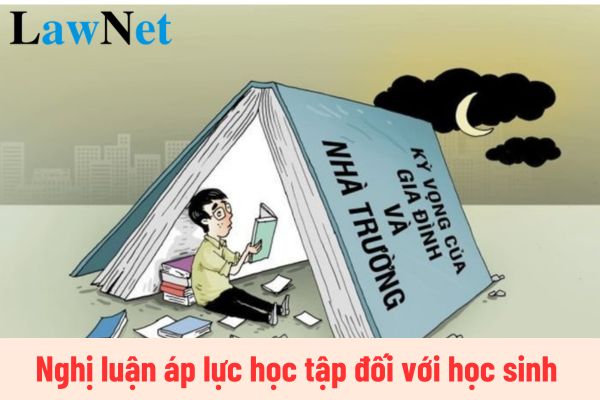Vietnam: What are the sample social argumentative essays on academic pressure on students today? What are the perspectives on developing the Literature curriculum at the upper secondary level?
What are the sample social argumentative essays on academic pressure on students today?
The argumentation on academic pressure on students today is a type of essay that analyzes, evaluates, and deliberates on the issue of academic pressure that students are facing. This essay often delves into the causes of pressure, and the impacts of this pressure on students, and proposes solutions to alleviate it.
The argumentation on academic pressure on students today is practiced by upper secondary school students in their curriculum.
|
What are the sample social argumentative essays on academic pressure on students today?
|
Note: The sample social argumentative essays on academic pressure on students today are for reference only./.

What are the sample social argumentative essays on academic pressure on students today? What are the perspectives on developing the Literature curriculum at the upper secondary level? (Image from the Internet)
What are the perspectives on developing the Literature curriculum at the upper secondary level in Vietnam?
According to the General Education Program for Literature issued with Circular 32/2018/TT-BGDDT, perspectives on developing the Literature curriculum at the upper secondary level in Vietnam are as follows:
The Literature curriculum adheres to the basic regulations stated in the General Program while emphasizing several perspectives:
- The Literature curriculum is developed on theoretical and practical foundations, updates on research achievements in education, psychology, and teaching methodology of Vietnamese literature; achievements in literature and linguistics research; achievements in Vietnamese literature across various periods; experiences in developing Vietnamese literature curricula, particularly from the early 21st century until now, and international trends in curriculum development in general, and the Literature curriculum in particular over recent years, especially from developed countries; societal practice, education, economic conditions, and Vietnamese cultural tradition, especially the diversity of students in terms of regions, conditions, and learning abilities.
- The Literature curriculum focuses on training communication skills (reading, writing, speaking, and listening) as a central theme throughout all three education levels to meet the program's capacity-oriented direction and ensure coherence and continuity across all grades and levels. Fundamental, foundational knowledge about the Vietnamese language and literature is formed through activities in comprehending and creating texts; directly serving the requirement of training in reading, writing, speaking, and listening skills.
- The Literature curriculum is developed with an open approach, reflected in not specifying detailed teaching content but stipulating the outcomes needed in reading, writing, speaking, and listening for each grade; delineating some basic, core knowledge about the Vietnamese language, literature, and some texts with a significant, crucial position in national literature as mandatory content for students nationwide.
- The Literature curriculum meets both the innovation requirements and emphasizes inheriting and enhancing the strengths of existing Vietnamese literature curricula, especially the current one.
What are the objectives of the Literature curriculum at the upper secondary level in Vietnam?
Under Section 3 of the Appendix of the General Education Program for Literature issued together with Circular 32/2018/TT-BGDDT, the objectives include:
- To help students continue to develop qualities that were formed in middle school; expand and elevate the development of qualities with specific manifestations: possessing determination, individuality, ideals and aspirations, capable of preserving and promoting Vietnamese cultural values; possessing a spirit of integration and global citizenship awareness.
- Continue developing competencies formed in middle school with higher requirements: comprehending both explicit and implicit content in various texts at higher difficulty levels reflected in scope, content, and reading requirements;
Comprehension with the demand for developing critical thinking; applying knowledge about characteristic literary terms, literary movements and trends, author styles and works, internal and external elements of texts to build independent reading skills. Writing proficiently in essay and comprehensive expository (integrating expressive modes and argumentative operations), following a correct process, having individual perspectives, ensuring logic and persuasiveness. Speaking and listening flexibly;
Be capable of interpreting and evaluating both content and expressive form of presentations; capable of participating in discussions with individual perspectives, personality, with an appropriate debating attitude in discussions.
Develop literary competency with requirements: differentiate literary works from works of other art forms; analyze and comment on features of literary language; differentiate between expressives and what's expressed in literature; recognize and analyze, appreciate literary works based on literary style characteristics; possess rich imagination, know how to appreciate, receive and evaluate literature; create some literary products.

